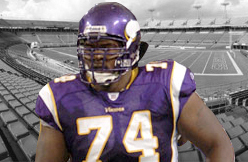Being big has obvious rewards. There are millions of dollars Bryant McKinnie never would have made, had he stopped filling out, oh, 100 pounds ago.
But size isn't always an advantageous matter.
That's one reason why McKinnie, Minnesota's hulking left tackle, was delighted when the Vikings drafted Phil Loadholt in the second round. Finally, the 6-foot-8, 335-pound McKinnie has someone who can relate to the experience of playing in such a large body.
Loadholt has the same height, and he's listed even heavier at 343 pounds.
"There's just some things that we can't do, that everybody else can do," McKinnie said.
Take blocking, for example, particularly on field goal attempts. Coaches have criticized McKinnie's technique, some of which he claims is beyond his control and simply part of being so big.
"Sometimes they tell you to bend - 'Oh, bend your knees' - but you have somebody that's four inches shorter than you next to you," McKinnie said. "They make you feel like you're not bending, but you are."
The standard NFL line is that starting spots, especially for rookies, are never guaranteed. Loadholt, however, is the clear front-runner at right tackle following a 2008 season in which Ryan Cook regressed from the year before and Artis Hicks was often hurt.
The draft was deep at his position, so Loadholt's landing in the second round was attributable to concerns about his footwork and conditioning. He brings, however, plenty of upside.
"You can have a huge guy on your offensive line and, depending on how his play is, it can make a difference or it can't," running back Adrian Peterson said over the weekend during the team's mandatory minicamp at Winter Park. "But him being from Oklahoma and me knowing his background, I will definitely be excited if he gets on the field."
On draft day, Peterson offered this: "You think about him and Big Mack, with their size, and it's a dream for a running back."
Loadholt has much to learn, beginning with the playbook. He had a false start penalty during the full-team scrimmage portion Saturday, evidence of the overwhelming nature of those first few practices with a new team.
McKinnie, though, is eager to advise.
"That'll make him a better player even faster," said McKinnie, a first-round draft pick in 2002 who has had his share of ups and downs but was deemed valuable enough by the Vikings three years ago to get a contract extension through the 2013 season.
Like McKinnie, Loadholt is reserved and quiet around reporters, a soft-spoken demeanor that seemingly contradicts the players' size. They both went to junior college before transferring to big-time - no pun intended - schools.
"He's been successful in this league for a long time," Loadholt said. "He's a guy I've looked up to since he's been playing, so I'm definitely excited about the opportunity to learn some things from him."
Looked up to, of course, is a figurative term. Loadholt is thicker than McKinnie, with shoulder-length dreadlocks that make him appear even wider.
"That is a massive human being," coach Brad Childress said last month.
Loadholt said he couldn't have been put in a better place to begin his career, given the veterans around him on the line and the star in Peterson behind him in the backfield.
Now he's looking forward to playing up to that, well, large potential of his.
"He's physically gifted. He's handled himself well. I like his temperament," offensive coordinator Darrell Bevell said. "He's got a little bit of physicalness to him, so I like what I've seen so far."
(seattletimes.com)


